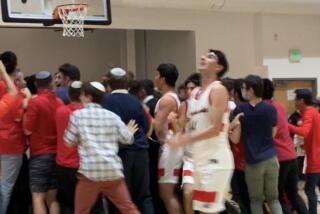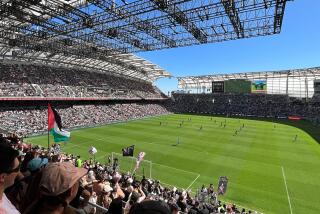Israel soccer team plans to add 2 Muslims, despite fans’ anger
JERUSALEM — Managers of a popular Jerusalem soccer club vowed Wednesday to proceed with plans to introduce two Muslim players to the mostly Jewish team despite a backlash from some fans.
The two new players, Zaur Sadayev and Gabriel Kadiev from the breakaway Russian republic of Chechnya, arrived in Israel amid tight security and expressed hopes that they would be welcomed as new players for Beitar Jerusalem.
But a group of fans protested their impending arrival during a game last weekend, unfurling a large banner that read, “Beitar Forever Pure.” They also chanted slogans, such as “No Entry for Arabs,” although the players are not Arabs.
Though Beitar fans have a long, checkered history of racist outbursts and violence, the latest behavior shocked many here. Critics said use of the word “pure” was particularly offensive since similar language has been used against the Jewish people, including during the Holocaust.
“Racism has struck the Jewish people harder than any other nation in the world,” said Israeli President Shimon Peres. “Authorities must prevent it before it starts.”
The Israel Football Assn. on Tuesday levied a $13,500 fine against the team over fans’ racist taunts last weekend.
But Beitar managers were so worried about their fans’ lingering anger that they initially suggested that Tuesday night’s match against Maccabi Umm al-Fahm, a mostly Arab team, be played in an empty stadium in Jerusalem. The game went ahead as planned with spectators in the stands, but hundreds of police were dispatched to maintain the peace and keep fans of the two teams separated. Beitar won, 5-0.
Beitar officials said they would not back down from the decision to bring in the Chechen players.
“The fans don’t manage this team,” said Beitar spokesman Assaf Shaked. “It doesn’t matter whether a player is Jewish, Muslim or Christian. We want to change the behavior of the fans and clean up this violence. But we need the help of the government and the police. We can’t do it alone.”
Beitar’s team currently includes three foreign players who are Christian, but it is the only club in Israel to have never included an Arab. Several years ago, it signed another foreign Muslim player, but he left a few months later after being harassed by fans, Shaked said.
Beitar’s fans are widely known as some of the most aggressive and badly behaved in the country, even in a sport where antagonistic behavior is common. Many fans — who have long been associated with Israel’s right-wing nationalist movement — wear their “bad boy” image as a badge of honor.
Critics blame politicians and police for tolerating the activities for years and failing to crack down when fans cross the line.
In addition to chanting anti-Arab slogans and shouting insults about the prophet Muhammad, Beitar fans frequently scream like monkeys or throw plastic bananas on the field when black players take the ball.
They once shocked the country by refusing to observe a moment of silence for assassinated Prime Minister Yitzhak Rabin, who pursued a peace deal with Palestinians.
After a game a year ago, hundreds of young fans rioted through a shopping mall near the Jerusalem stadium, assaulting and harassing Arab workers and customers.
In recent days, some Israeli leaders have come out strongly against the behavior. Former Prime Minster Ehud Olmert, a long-time fan and supporter of the club, said he would boycott games until the racist fans were brought under control.
“Either we remove this group of racists from our field and cut it off from the team, or we are all like them,” he wrote in a newspaper column Tuesday. “I’m simply fed up with being identified with the benighted rudeness of people who never were and never will belong to what Beitar should symbolize in sports and in Israeli society.”
Some the team’s fans are unrepentant.
“If they bring in Muslims, the fans will burn down the club,” one man in his 20s told newspaper Yediot Aharonot. “That can’t happen. Arabs and Beitar Jerusalem don’t mix.”
More to Read
Sign up for Essential California
The most important California stories and recommendations in your inbox every morning.
You may occasionally receive promotional content from the Los Angeles Times.









